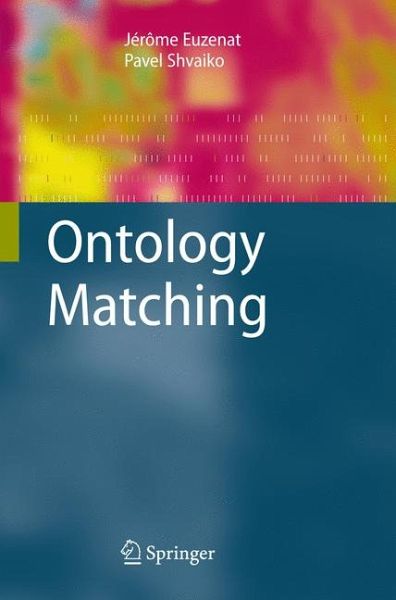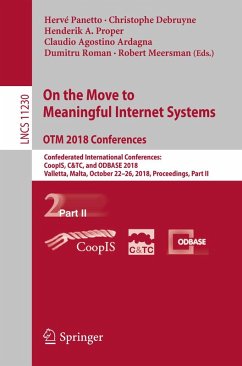
Ontology Matching (eBook, PDF)
Versandkostenfrei!
Sofort per Download lieferbar
56,95 €
inkl. MwSt.
Weitere Ausgaben:

PAYBACK Punkte
28 °P sammeln!
Ontologies tend to be found everywhere. They are viewed as the silver bullet for many applications, such as database integration, peer-to-peer systems, e-commerce, semantic web services, or social networks. However, in open or evolving systems, such as the semantic web, different parties would, in general, adopt different ontologies. Thus, merely using ontologies, like using XML, does not reduce heterogeneity: it just raises heterogeneity problems to a higher level.Euzenat and Shvaiko's book is devoted to ontology matching as a solution to the semantic heterogeneity problem faced by computer s...
Ontologies tend to be found everywhere. They are viewed as the silver bullet for many applications, such as database integration, peer-to-peer systems, e-commerce, semantic web services, or social networks. However, in open or evolving systems, such as the semantic web, different parties would, in general, adopt different ontologies. Thus, merely using ontologies, like using XML, does not reduce heterogeneity: it just raises heterogeneity problems to a higher level.
Euzenat and Shvaiko's book is devoted to ontology matching as a solution to the semantic heterogeneity problem faced by computer systems. Ontology matching aims at finding correspondences between semantically related entities of different ontologies. These correspondences may stand for equivalence as well as other relations, such as consequence, subsumption, or disjointness, between ontology entities. Many different matching solutions have been proposed so far from various viewpoints, e.g., databases, information systems, artificial intelligence.
With Ontology Matching, researchers and practitioners will find a reference book which presents currently available work in a uniform framework. In particular, the work and the techniques presented in this book can equally be applied to database schema matching, catalog integration, XML schema matching and other related problems. The objectives of the book include presenting (i) the state of the art and (ii) the latest research results in ontology matching by providing a detailed account of matching techniques and matching systems in a systematic way from theoretical, practical and application perspectives.
Euzenat and Shvaiko's book is devoted to ontology matching as a solution to the semantic heterogeneity problem faced by computer systems. Ontology matching aims at finding correspondences between semantically related entities of different ontologies. These correspondences may stand for equivalence as well as other relations, such as consequence, subsumption, or disjointness, between ontology entities. Many different matching solutions have been proposed so far from various viewpoints, e.g., databases, information systems, artificial intelligence.
With Ontology Matching, researchers and practitioners will find a reference book which presents currently available work in a uniform framework. In particular, the work and the techniques presented in this book can equally be applied to database schema matching, catalog integration, XML schema matching and other related problems. The objectives of the book include presenting (i) the state of the art and (ii) the latest research results in ontology matching by providing a detailed account of matching techniques and matching systems in a systematic way from theoretical, practical and application perspectives.
Dieser Download kann aus rechtlichen Gründen nur mit Rechnungsadresse in A, B, BG, CY, CZ, D, DK, EW, E, FIN, F, GR, HR, H, IRL, I, LT, L, LR, M, NL, PL, P, R, S, SLO, SK ausgeliefert werden.













